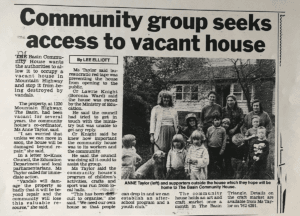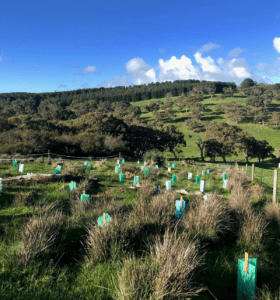Parlour Associate Alison McFadyen asks new graduates (and her younger self) to reflect on their personal core values and true purpose in architecture.

On reflection of my architectural career to date, I realise that I have experienced some amazing opportunities to work on a variety of projects in multiple sectors. Nevertheless, thinking about some of the currently ‘expected’ and accepted ways of working within this industry fills me with a degree of regret and, quite frankly, angers me at the state of our profession. If anything, I hope this letter to my younger self can assist and challenge new graduates coming into our industry to reflect on their current work situation and to ask themselves, “what is my purpose in all of this and what am I doing to work towards meeting that purpose?”
For me, learning from this advice is still definitely a work in progress!
Dear Younger Self Ali,
I am writing this letter in ten years’ time, when I have been out of university for a decade. And yes, I still have that baby face and don’t look my age, which I’ve discovered isn’t necessarily a compliment in the construction industry. But I no longer dwell on this. Here is some advice and reflections on the architecture profession so far.
What is the definition of hard work in architecture?
From a very young age, you were taught the definition of hard work, which included spending lots of time getting lots of results and you have always pushed yourself to try your best.
I know you are a hard worker, will strive for the best result possible at anything you do (and, let’s face it, are a bit of a perfectionist), but remember to pace yourself as this can be dangerous in the architectural industry. At the beginning of your career, architecture will seem relentless at times and may well feel out of your control. You will continue to experience tighter programs, lower fees and, therefore, less time to achieve the desired outcome. Ultimately, for practices to remain viable they will need to work differently, be nimble and adaptive, and use precious resources well. Be part of leading the change!
Working long hours to achieve the desired outcome will catch up with you. It is very important to be self-aware, take time to catch your breath and recognise when the brakes need to be applied. Remember to work hard but smart, and understand that regularly working eight efficient hours instead of 15 lethargic hours is more effective and infinitely more sustainable.
Being a good architect requires you to be focused on not only yourself but your team and the wider community. You need to have a work life balance to experience this! Working long hours decreases your focus and limits many other opportunities that exist outside your working day.
Choose to lead from the front. It doesn’t take more time to be organised, plan out your time carefully, work out what is achievable and then the resources required to achieve this. Have the confidence to speak up if this isn’t aligning or resources are unrealistic. Good employers understand that a happy workplace is a more productive workplace and that their employees are their most precious resource.
Constant excessive working hours will take its toll on you, which can lead to irreversible health issues. Ten years from now, there is going to be a lot of attention on mental wellbeing within your industry; don’t become one of the negative statistics.
Challenging how you define and practise ‘hard work’ will result in you being more resilient, happy, healthy and a better architect.
Where did all the women go?
Being one of three daughters, you have never been made to feel like you couldn’t achieve or be part of something because of your gender. This is your strength and remember it.
This is likely to smack you in the face, however, when you start working full time in the construction industry. The lack of women visible will make you feel vulnerable and completely out of your comfort zone.
To manage this, if you find yourself in a practice with few women I recommend that you get a female mentor. It’s important to have some gender role models early on in your career when you are still finding your feet.
Whether in the office, onsite or in a consultant meeting, you are likely to experience conscious and unconscious bias because of your gender. You will have the feeling that you have to work hard to prove yourself to be heard and respected in your role. You will be spoken over and inappropriate comments will be made in your direction. You will be told by a sub-contractor much bigger than you that ‘I am not going to talk to you as you wouldn’t understand because you are not a bloke’.
Remember the strength you were brought up with to believe that anything is achievable and SPEAK UP as this behaviour is so clearly unacceptable. Taking action can be difficult but is the only way to drive the change that needs to happen.
Diversity of gender within any industry is very important. Ensure you align yourself with practices where this is evident.
Be clear on your values
It is important to work out your core values and ensure you are surrounded by people who can best support these. When your values are respected and are in alignment with those of the practice and others you work with, great outcomes can be achieved. It is important to stand up for your values and be clear on your non-negotiables.
Remember your roots and what makes you tick. In the newspaper article below, you are front and centre at the age of four, which gives a hint about the environment in which you grew up and the importance of a social conscience and commitment to collective impact.

Connection to your regional home and the environment is extremely important and influential to you. It highlights how all your experiences outside the office shape you and the ‘everything other’ you do in life.
Collaboration has always been important to you and leveraging the best out of people.
Respect and trust.
Believe in yourself, celebrate the wins and stop thinking that you haven’t done enough. Again, it is the ‘everything other’ that you will do as a collective that will create change.
So, what is your purpose?
To ambitiously and ethically pursue excellence in architecture.
And how will you go about working towards your purpose?
- Be socially and environmentally aware with people at the core of your work.
- Enable and empower others through sharing knowledge and experience.
- Be respected in whichever role you choose.
- Surround yourself with people with aligned ethics and values.
- Be adaptive in your thinking and practices.
- Collaborate.
- Influence in a way that is respectful of people’s own experiences and culture.
- Be self-aware and self-caring.
- Challenge the status quo – because this is the way we have always done it is not a reasonable industry response!
- Identify what nurtures you in your work and personal life… then make sure you do more of it!
- Practise lifelong learning – not just in architecture but in leadership and other areas that interest you.
- Remember that the skills you learn in architecture can transcend into so many other disciplines and facets of life. Use this to your advantage.
All the best on your exciting journey!

Alison McFadyen is currently an Associate Architect at Das-Studio in Adelaide, South Australia, an Associate for Parlour: women, equity, architecture, and a part-time farmer on weekends at her rural property on the Fleurieu Peninsula, South Australia (pictured above).




















